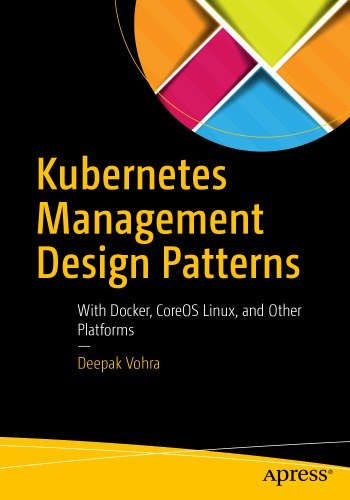Product desciption
Kubernetes Management Design Patterns With Docker Coreos Linux And Other Platforms Vohra by Vohra, Deepak 9781484225974, 9781484225981, 148422597X, 1484225988 instant download after payment.
Take container cluster management to the next level; learn how to administer and configure Kubernetes on CoreOS; and apply suitable management design patterns such as Configmaps, Autoscaling, elastic resource usage, and high availability. Some of the other features discussed are logging, scheduling, rolling updates, volumes, service types, and multiple cloud provider zones. The atomic unit of modular container service in Kubernetes is a Pod, which is a group of containers with a common filesystem and networking. The Kubernetes Pod abstraction enables design patterns for containerized applications similar to object-oriented design patterns. Containers provide some of the same benefits as software objects such as modularity or packaging, abstraction, and reuse.
CoreOS Linux is used in the majority of the chapters and other platforms discussed are CentOS with OpenShift, Debian 8 (jessie) on AWS, and Debian 7 for Google Container Engine.
CoreOS is the main focus becayse Docker is pre-installed on CoreOS out-of-the-box. CoreOS:
Supports most cloud providers (including Amazon AWS EC2 and Google Cloud Platform) and virtualization platforms (such as VMWare and VirtualBox)
Provides Cloud-Config for declaratively configuring for OS items such as network configuration (flannel), storage (etcd), and user accounts
Provides a production-level infrastructure for containerized applications including automation, security, and scalability
Leads the drive for container industry standards and founded appc
Provides the most advanced container registry, Quay
Docker was made available as open source in March 2013 and has become the most commonly used containerization platform. Kubernetes was open-sourced in June 2014 and has become the most widely used container cluster manager. The first stable version of CoreOS Linux was made available in July 2014 and since has become one of the most commonly used operating system for containers.
What You'll Learn
Use Kubernetes with Docker
Create a Kubernetes cluster on CoreOS on AWS
Apply cluster management design patterns
Use multiple cloud provider zones
Work with Kubernetes and tools like Ansible
Discover the Kubernetes-based PaaS platform OpenShift
Create a high availability website
Build a high availability Kubernetes master cluster
Use volumes, configmaps, services, autoscaling, and rolling updates
Manage compute resources
Configure logging and scheduling
Who This Book Is For
Linux admins, CoreOS admins, application developers, and container as a service (CAAS) developers. Some pre-requisite knowledge of Linux and Docker is required. Introductory knowledge of Kubernetes is required such as creating a cluster, creating a Pod, creating a service, and creating and scaling a replication controller. For introductory Docker and Kubernetes information, refer to Pro Docker (Apress) and Kubernetes Microservices with Docker (Apress). Some pre-requisite knowledge about using Amazon Web Services (AWS) EC2, CloudFormation, and VPC is also required.


